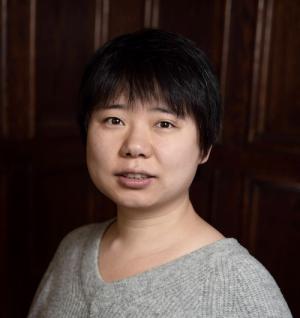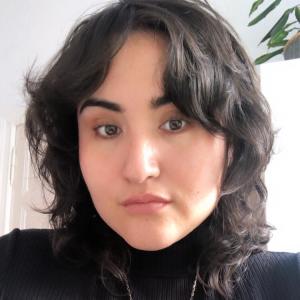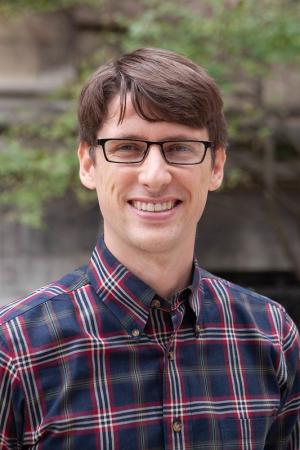
RESEARCH INTERESTS
Chinese history; economic and environmental history; gender, technology, and knowledge making; infrastructure
BIOGRAPHY
王悠 Wáng Yōu (she/they) is an economic and environmental historian of early modern and modern China. Her current book project, Crafting the Waterscape: Environmental Governance and Rural Communities of the Lower Yangzi Delta, 1500-1850, examines the everyday interactions of village women and men with water- and landscapes in China's economic center through hydraulic institutions, agricultural knowledge production, and a gendered labor regime. She is also interested in continuing exploring the intertwinement of the environment, gender, and the market through the lens of vernacular religion and global trade.
Before coming to the University of Chicago as a Harper-Schmidt Fellow and Collegiate Assistant Professor in the Social Sciences Division, she received her doctoral degree in History from the University of California, Los Angeles (UCLA) in 2022. She is also an alumna of the University of Chicago (A.M. '14) and Zhejiang University (Bachelor of Economics '12).

PhD 2020 (History) New York University
MA (Social Thought) New York University
BA & BFA (Visual & Critical Studies) School of the Art Institute of Chicago
RESEARCH INTERESTS
United States; transatlantic history; history of liberalism; capitalism; labor history; intellectual history; history of immigration; social reform; slavery and emancipation
BIOGRAPHY
I am a historian of political thought, trans-Atlantic intellectual history, and American society in the long nineteenth century. Before my PhD training at New York University, I studied Visual and Critical Studies at the School of the Art Institute Chicago, with a focus on Frankfurt School Critical Theory. I have taught at Barnard College, the Pratt Institute of Art, New York University, and lectured at the New York Public Library.
My research to date centers on three key issues that defined political life in nineteenth-century America: the transformation of the liberal tradition after the advent of mass democracy, the mass immigration of European exiles into American civil-society associations, and the social crisis of labor and property after the Civil War.
I am currently working on my first book, Reform in the Age of Capital, where I place U.S. political history within the transatlantic crisis of liberalism after the Era of Restoration that culminates in the Revolutions of 1848 and the American Civil War. I argue that the political and intellectual contributions by European émigrés in the nineteenth century fostered a social-democratic perspective within the American reform tradition and connected reformers to a lively movement of ideas across cosmopolitan networks, with nodal points in London, New York and Paris. Transatlantic social democrats were a diverse group of reformers who broke with republican solutions to the “social problem”— the declining condition of laborers and the emergence of systemic unemployment. Social democrats demanded new rights for laboring citizens, including the “right to land,” the right to “the fruits of [their] labor,” the right to “free time,” and the “right to work,” and called for the establishment of a novel “social republic” to supersede the limitations of political representation. Throughout the book, I explore the common aspirations across abolitionist and labor reformers, English Chartists, German revolutionaries, and French utopians, who sought to realize the ideals of the revolutions of the seventeenth & eighteenth centuries under the unprecedented conditions of industrializing nations. Funding for this project has been provided by the Fulbright, IIE, the Mellon Foundation, and by the Jerrold Seigel Fellowship in Intellectual and Cultural History. A chapter of the unpublished manuscript won the 2020 Bernard Bellush Prize in Labor History, from the New York Labor History Association.

PhD 2018 (history) University of Chicago
RESEARCH INTERESTS
Modern Europe; Austria and Germany; intellectual history; history of the human and social sciences; history of medicine; psychoanalysis; critical theory
BIOGRAPHY
I am an intellectual historian of German-speaking Central Europe in the nineteenth and twentieth centuries. At the crux of my research is an interest in what might be called the politics of the self in the modern era, a subject I explore through the history of human and social sciences and the history of medicine. In my monograph in progress, for instance – titled Analysis in Extremis: The Interwar Crisis and the Remaking of Psychoanalysis – I examine the ways that Central European psychoanalysts refashioned their therapeutic techniques around new theories of the psyche between the World Wars. Amid the turmoil and violence of the times, the psychological presuppositions of orthodox (“classical”) psychoanalysis – namely, a relatively strong, mature, reflective ego – appeared to vanish. The result, I argue, was a profound crisis for the liberal politics of psychoanalysis that was accompanied by an explosion of experimental revisions and novel applications of psychoanalytic technique. By tracing the ramifications of this crisis, Analysis in Extremis shows how the wider social and political turmoil of the interwar led to a rethinking of the self in psychoanalytic thought and a recasting of the politics of analytic practice.
Over the past few years and building on this research, I have begun a new project – a transatlantic history of the study of authority and the family over the middle decades of the twentieth century. This project will explore how intellectuals from a wide range of critical perspectives and disciplinary traditions (philosophy, sociology, anthropology, critical theory, and psychoanalysis) sought to make sense of the political pathologies of the times by investigating the shifting patterns of child-rearing and youth socialization. For several decades at mid-century and largely owing to the influence of Freudianism, how subjects were drawn into the fabric of social life appeared to many intellectuals to hold the key to explaining the manifold threats to liberal democracy.
After receiving my PhD in 2018, I held a two-year position as Junior Fellow in the Society of Fellows at the South University of Science and Technology in Shenzhen, China. Since returning to Chicago in 2021, I have been enrolled in the training program of the Chicago Psychoanalytic Institute.
FRONT TABLE MENTOR
John P. McCormick
PUBLICATIONS
“How Red Vienna Revolutionized Sigmund Freud,” Jacobin, 28 May 2020
